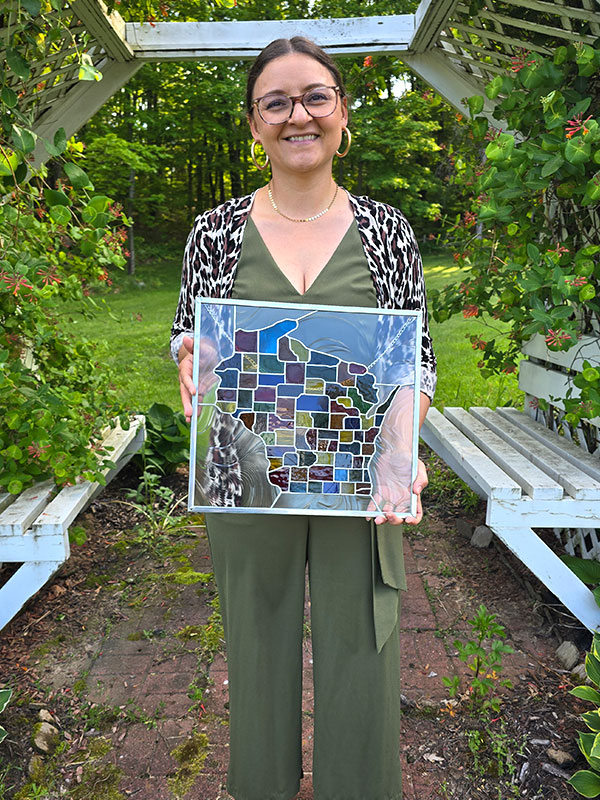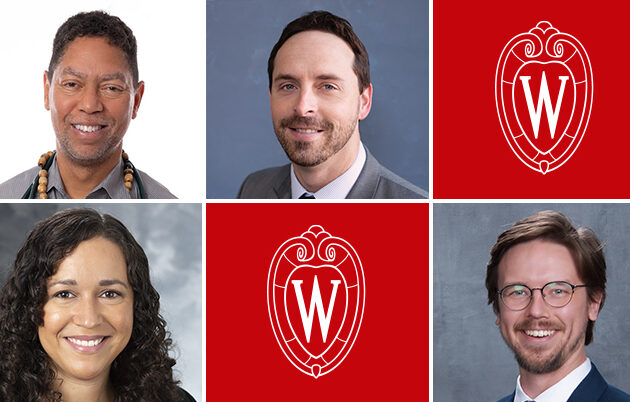Michelle Clark-Forsting, MD ’12, MPH, MBA, FAAFP (PG ’15), was raised in Alma Center and lives there with her family today. In one of her many professional roles, she is the primary preceptor at the Krohn Clinic in nearby Black River Falls, where she mentors students who are working toward medical, physician assistant and nurse practitioner degrees.
In May 2024, Clark-Forsting received the Max Fox Preceptorship Award from the Wisconsin Medical Alumni Association (WMAA) and University of Wisconsin School of Medicine and Public Health (SMPH). The award is given annually to a Wisconsin preceptor whose effective service has helped guide medical students at SMPH. She is a clinical adjunct assistant professor in the school’s Department of Family Medicine and Community Health.
Student testimonials in support of the award referred to Clark-Forsting as “an amazing mentor,” “warm, kind, and very engaging,” and “one of the best [mentors] I’ve had in medical school.”
As a physician and teacher, Clark-Forsting — who earned a master of public health degree before entering medical school at SMPH — looks at health through the dual lens of individual care and public responsibility. Success in both, she believes, relies on her core belief that medicine often is more of an art than a science.
Clark-Forsting’s childhood sounds like Andy Griffith’s town of Mayberry. Her father worked on the Union Pacific Railroad, and her mother had a variety of careers, ending her working years as the director of volunteer services at Black River Memorial Hospital, just across the street from the Krohn Clinic.
“I’d be outside playing with my friends from sun-up to sundown,” she recalled. Clark-Forsting rode her bike, played “Ghost in the Graveyard,” and bought Tootsie Rolls at the small grocery store. Both she and her sister, Jaime (now a veterinarian), developed a love for science, a deep affection for animals and an understanding of how to get things done.
“Our parents instilled in us the desire to do things well,” she recalled. “They said, ‘In everything you do, put your all into it!’ And they always had our backs.”
In 2008, Clark-Forsting joined the Wisconsin Academy for Rural Medicine (WARM), the MD track within SMPH that focuses on admitting and training students committed to improving the health of rural communities. Small-town and rural living was her sweet spot, and WARM was a great fit.
“During our obstetrics rotations, I delivered eight babies,” she noted. “And in general surgery, we were usually first assist, not fourth or fifth.”
Her subsequent family-practice residency at UW Health-Augusta gave her additional opportunities to develop self-reliance in her medical practice.
“We had to figure out what we could do with the limited resources at hand,” she said.
Following her residency, Clark-Forsting joined the medical staff at the Krohn Clinic, where she now serves as president. She devotes about half of her time taking care of patients and the other half coordinating clinic operations and administration. Even as the clinic has expanded its specialty care offerings, she has made it a priority to keep the small-town feel — talking with patients about their lives, their families, their joys, and their struggles.
Clark-Forsting and her husband, Kevin Forsting, have three children who attend school in Alma Center, but their childhood isn’t quite as “Mayberry” as hers was.
“Kids in our community still have this experience to some degree,” she pointed out. “In my opinion, however, it is different because there are all sorts of readily available technologies that have taken the place of face-to-face play.”
To help counteract the effects of too much screen time, she and her husband coach multiple kids’ sports — promoting physical activity and keeping a visible presence in the community.
Clark-Forsting said her approach to clinical practice emphasizes meeting patients where they are, providing the best possible care while respecting patient autonomy. During the pandemic, she appeared on podcasts to address concerns about COVID-19 and related topics, including immunizations. She was direct about the science: vaccines are safe, and they save lives. But then came the art: a gentle but powerful reminder that, before vaccines were widely available, children lost their lives to diseases that are now preventable.
“My goal is to have learners finish their rotations with us having a better understanding of the personalized care we can provide in rural communities,” Clark-Forsting said. “The connection I have with my patients, their families, and the community is at the center of everything I do.”


